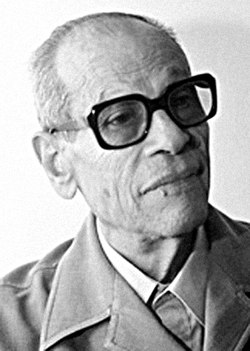Naguib Mahfouz Quote
Related Quotes
For everything in this journey of life we are on, there is a right wing and a left wing: for the wing of love there is anger; for the wing of destiny there is fear; for the wing of pain there is heali...
C. JoyBell C.
Tags:
ancient, flight, flying, human race, humanity, imperfection, inspirational, inspirational life, inspiring, journey
The global population of Earth are involved in the following corporate government experiments: The long term effects of - 1. Nuclear bomb fallout radiation. 2. Man-made wireless radio frequency (RF) r...
Steven Magee
Tags:
abnormally, adaptation, aircraft, airplanes, atmosphere, atom, bodies, bomb, chemical, chemtrails
I have drunk the night and swallowed the stars. I am dancing with abandon and singing with rapture. There is not a thing I do not love. There is not a person I have not forgiven. I feel a universe of...
Kamand Kojouri
Tags:
abandon, afterlife, bereavement, celebrate, celebration, dance, dancing, death, death poems, deceased
About Naguib Mahfouz
Naguib Mahfouz Abdelaziz Ibrahim Ahmed Al-Basha (Arabic: نجيب محفوظ عبد العزيز ابراهيم احمد الباشا, IPA: [næˈɡiːb mɑħˈfuːzˤ]; 11 December 1911 – 30 August 2006) was an Egyptian writer who won the 1988 Nobel Prize in Literature. In awarding the prize, the Swedish Academy described him as a writer "who, through works rich in nuance – now clear-sightedly realistic, now evocatively ambiguous – has formed an Arabian narrative art that applies to all mankind". Mahfouz is regarded as one of the first contemporary writers in Arabic literature, along with Taha Hussein, to explore themes of existentialism. He is the only Egyptian to win the Nobel Prize in Literature. He published 35 novels, over 350 short stories, 26 screenplays, hundreds of op-ed columns for Egyptian newspapers, and seven plays over a 70-year career, from the 1930s until 2004. All of his novels take place in Egypt, and always mention the lane which equals the world. His most famous works include The Cairo Trilogy and Children of Gebelawi. Many of Mahfouz's works have been made into Egyptian and foreign films; no Arab writer exceeds Mahfouz in number of works that have been adapted for cinema and television. While Mahfouz's literature is classified as realist literature, existential themes appear in it.
